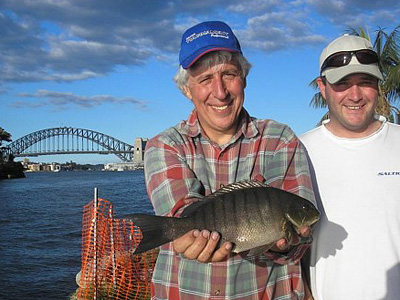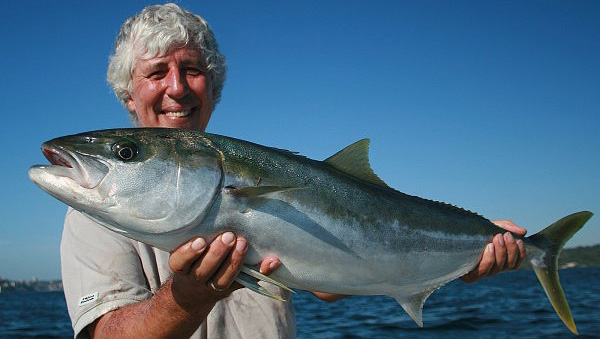Perhaps as a ‘pom’ coming from a country where sea anglers neither pay a fishing licence or have very few size or bag limits I should be a little careful about expressing a view on these matters to our Aussie cousins. However, I’ve spent a fair time fishing out there and done my best to help them get organised so that politicians in this fishing mad country start acknowledging the huge contribution that angling makes to both local communities and the national economy. Here’s what I wrote recently in my capacity as Foreign Editor of Australian Fishing World…
As a former resident and reasonably regular visitor to Sydney I’ve been following the debate over the New South Wales state bag and size limit review with a mixture of alarm and despondency to the point where I’m now starting to wonder if some of their rec fishing representatives actually want to do anything that would improve their local fisheries. It seems to me that there’s a real danger that ‘conservation’ has become a dirty word in the eyes of too many folk involved in fishing in Australia. A couple of years ago when I wrote my Keep Australia Fishing report for the Australian Fishing Trades Association (AFTA) I said:
‘Healthy fisheries managed sustainably, pristine water quality, abundant habitat to aid successful fish recruitment and a population overwhelmingly committed to both enjoying and protecting the resource are some of the most important factors in ensuring a strong future for recreational fishing.’
Having spent half a lifetime in mainstream politics as a passionate advocate for the benefits of recreational fishing and the aquatic environment on which it depends and having examined both angling governance and fishery management regimes in Europe, USA, Australia and New Zealand, there is nothing that will ever shake my conviction that our sport must always be positioned front and centre in favour of conservation and sustainable fishing practices. And you know what? Sometimes that means showing leadership and not just whingeing about the behaviour of others.
 From what I’ve read recently I really worry that Aussie anglers are in real danger of losing public and political support by vacating the moral high ground in favour of an unedifying shitfight with the pros to see who can catch the last fish in the ocean. I fully expect a majority of the commercial sector and those who are paid to advocate for them to argue for their unalienable right to catch what they want, where they want and how they want, irrespective of the impacts on either the environment or on the 4 million Aussies who enjoy recreational fishing. This is not just an Australian thing for they’ve done it the world over.
From what I’ve read recently I really worry that Aussie anglers are in real danger of losing public and political support by vacating the moral high ground in favour of an unedifying shitfight with the pros to see who can catch the last fish in the ocean. I fully expect a majority of the commercial sector and those who are paid to advocate for them to argue for their unalienable right to catch what they want, where they want and how they want, irrespective of the impacts on either the environment or on the 4 million Aussies who enjoy recreational fishing. This is not just an Australian thing for they’ve done it the world over.
Witness the raping of the impoverished West African fisheries by the very super trawlers that federal opposition leader Tony Abbott wants to allow to operate in Australian waters. Look at the collapse of the once prolific cod fisheries of the Newfoundland Grand Banks in Canada, the near destruction of the North American striped bass fishery, or the appalling over fishing of the North Sea as a result of the idiotic European Common Fisheries Policy.
The lessons from these disasters are crystal clear. In the race to the bottom everyone loses and it is only by the introduction and enforcement of rigorous sustainable fishery management practices on all sectors that stock collapses can be avoided or recovery measures can be allowed to succeed. And that means bag and size limits, commercial quotas and gear restrictions, protected nursery areas and spatial closures to assist successful recruitment. It means managing our fisheries for tomorrow and recognising that we do not have the luxury of an inexhaustible resource.
And here’s the rub – I also firmly believe that those of us who fish for fun rather than for our livelihoods need to be prepared to lead the way in best practice and to be out there making the case for the best possible conservation practices. It would be great to see the pros rallying to the same cause, perhaps some will but I’m not holding my breath.
Across the world we can see rec fishers leading by example and banging the drum for conservation and sustainable fishery management. These are people who have moved on from the zero sum game which is the real ‘tragedy of the commons’ where folk say.. ‘if I don’t take these fish someone else will.’ Take a look at Florida where whole areas are closed to allow for stock recovery and size and bag limits follow optimum spawning size and stock density measurements to allow for successful recruitment and to ensure that the fisheries remain sustainable.
By getting themselves organised, regularly emphasising the greater economic value of recreational fishing and taking the conservation high ground rec fishers in parts of the US have been able to push through some great policy changes that we can only dream about in Australia.
Check THIS out from North Carolina
…where legislation was introduced which would give game-fish status to speckled trout, red drum and estuarine striped bass. This designation would prohibit catching these fish by net and selling them for consumption.
We can only dream of introducing policies like these in the current political climate in Australia with the perhaps the honourable exception of the Northern Territories where both the public and the politicians recognise both the value of rec fishing and the need for meaningful conservation measures.
Meanwhile – back in New South Wales…
In my view the reaction to the very sensible and long overdue measures in the NSW bag and size limit review have been profoundly depressing. Some of the same people who for years have been arguing that it is a nonsense to be taking kingfish or jewfish out of the fishery below spawning size and well before they’ve had a chance to breed, or that it is irresponsible to take 20 bream or blackfish in a day are now finding reasons to reject these much needed changes. Of course there should be greater restrictions and controls on the commercial sector but we are hardly likely to win these arguments until we adopt sustainable fishing practices ourselves that will stand close scrutiny.
I’ve probably fished in Oz for best part of two years out of the last five and I’m the first to admit that there’s a lot that I don’t know and haven’t seen. But I know that within a short drive of Sydney there are communities where rec fishers openly sell on their ‘surplus catches’ to the local pros, that the reason it can at times be impossible to land a legal sized kingie in the harbour is because almost everything that can be killed has been killed, that the once common jewfish are as rare as rocking horse shit and that the fishing for most species ain’t what it was, particularly near to large urban conurbations.

I know that in New Zealand they have some of the best kingie fishing in the world. Could this be, I wonder, anything to do with having a bag limit of two fish and not five and a size limit of 75cm, not 65cm when the species doesn’t spawn until it reaches a minimum size of 70cm ? I know that bream are slow growing and need greater protection from both us and the pros and I know that there is a real danger that fishery management in NSW could be heading backwards under a minister who has yet to show any comprehension that stocks needs conserving.
There is so much that needs to be done, so many threats to the fishing future for the next generation of Australian anglers that they really do need to start walking the talk. How much easier would it be to be banging the drum for an end to beach and estuary netting, for the designation of key species as rec only and for stronger limits on destructive trawling practices if they got their own house in order first?
It is a nonsense to suggest that rec fishing has no impact at all on the resource. If this was the case we wouldn’t need bag and size limits at all. And whilst it is all too easy to demand more science and more controls on the other guys as a reason for doing nothing plain common sense tells us that we must do absolutely everything we can, when we can, to protect and regenerate the resource on which our fishing depends. Opportunities for change come along all too infrequently.
My worry is that they are about to blow it.
This article originally appeared in full as an opinion piece in Australian Fishing World last week and is reproduced on FM with Martin’s permission.










